

5 Truths of Innovation That People Get Wrong [INFOGRAPHIC] Innovation isn’t really supposed to be easy – if it were, everyone would be doing it.
![5 Truths of Innovation That People Get Wrong [INFOGRAPHIC]](http://cdn.pearltrees.com/s/pic/th/truths-innovation-infographic-119972363)
It’s risky, it takes work, and there is a lot of uncertainty involved. However, innovation can become more intuitive if you know the right ways to make it happen. Jeff DeGraff, the self proclaimed Dean of Innovation, claims that there are a lot of misconceptions when it comes to innovation. In the infographic below, he lays out five truths of innovation that most people get wrong, as well as tips on how to get them right.
Data won’t get you far.Suggestion: Stop collecting excessive dataFailure is inevitable.Suggestion: Start taking multiple shots at a single goalInnovation happens from the outside in.Suggestion: Start taking on the difficult cases and the lost causesConstructive conflict trumps consensus.Suggestion: If you don’t have anyone who thinks differently from you, you need to find them. The new ŠKODA Fabia Attention Test. Assessment: Should We Pursue This New Project? The Marshmallow Challenge. Final_article_for_BBVA.pdf. Innovation Leadership Lessons from the Marshmallow Challenge.
Scott D.
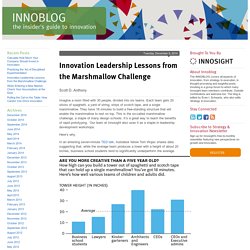
Anthony Imagine a room filled with 30 people, divided into six teams. Each team gets 20 sticks of spaghetti, a yard of string, strips of scotch tape, and a single marshmallow. They have 18 minutes to build a free-standing structure that will enable the marshmallow to rest on top. Why Smart People Struggle with Strategy - Roger Martin. By Roger Martin | 2:00 PM June 12, 2014 Strategy is often seen as something really smart people do — those head-of-the-class folks with top-notch academic credentials.

But just because these are the folks attracted to strategy doesn’t mean they will naturally excel at it. The problem with smart people is that they are used to seeking and finding the right answer; unfortunately, in strategy there is no single right answer to find. Strategy requires making choices about an uncertain future. Strategy Is No Longer a Game of Chess - Greg Satell.
By Greg Satell | 9:00 AM May 27, 2014 Legendary strategists have long been compared to master chess players, who know the positions and capabilities of each piece on the board and are capable of thinking several moves ahead.
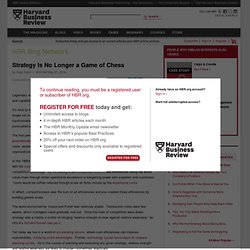
It’s time to retire this metaphor. Strategy is no longer a game of chess because the board is no longer set out in orderly lines. Start with a Theory, Not a Strategy - Todd Zenger. By Todd Zenger | 10:00 AM June 3, 2014 Well-crafted strategies are road maps to places that yield competitive advantage and generate value for the firm.
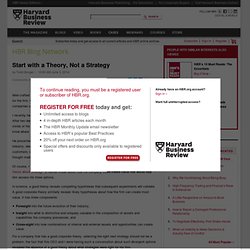
But once you’ve arrived, they don’t take you anyplace else. That’s a problem for companies under continual pressure from investors to find new sources of competitive advantage. I recently had lunch with the CEO of a large privately held corporation that illustrated this dilemma. After two decades of strong growth, he recognized that that his strategy had run its course. He presented to me three broad options for growth: diversify into a rather distant, weakly-related industry; develop and sell new services desired by their somewhat narrow set of existing customers; or expand globally into the same services they provide domestically.
How to Execute a 15-Word Strategy Statement - Alessandro Di Fiore. By Alessandro Di Fiore | 8:00 AM April 29, 2014 There is no shortage of stories and anecdotes to illustrate how the best strategies can nearly always be reduced down to a brief but powerful statement and even more ink has been spilled describing the dangers of strategy statements that read like detailed action plans.

But how do you go about actually crafting — and using — a 15-word strategy statement? My approach is based on narrative techniques. I begin by working with clients to write a story based on this template: Book Excerpt: The Other Side of Innovation. The climbers awoke just past midnight after hardly sleeping at all.
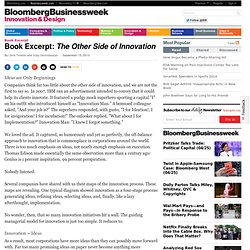
They were excited and alert. They were among the nearly ten thousand climbers each year that attempt to reach the heavily glaciated summit of Mount Rainier in the northwestern United States. IBM Innovation Man. hbsp.harvard.edu/he-main/resources/documents/web-files/the-other-side-instructor-resources%20091311.pdf.
Gauge Which Activities Aren’t in Sync with Your Strategy - Nick Chipman. By Nick Chipman | 10:00 AM March 14, 2014 Take this brief assessment for feedback on how to improve strategic alignment in eight key areas.

Should Big Companies Give Up on Innovation? Marginally Interesting: Data Analysis: The Hard Parts. Monday, February 17, 2014 I don’t know whether this word exists, but mainstreamification is what’s happening to data analysis right now.
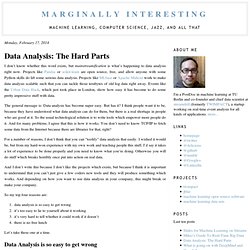
Projects like Pandas or scikit-learn are open source, free, and allow anyone with some Python skills do lift some serious data analysis. Projects like MLbase or Apache Mahout work to make data analysis scalable such that you can tackle those terabytes of old log data right away. Events like the Urban Data Hack, which just took place in London, show how easy it has become to do some pretty impressive stuff with data. The general message is: Data analysis has become super easy. www.innosight.com/innovation-resources/loader.cfm?csModule=security/getfile&pageid=2547. The World's Most Innovative Companies 2014. If you Google the phrase "faith-based businesses," the results point to companies that pursue a religious agenda.

But there's another kind of faith in business: the belief that a product or service can radically remake an industry, change consumer habits, challenge economic assumptions. Proof for such innovative leaps is thin, payoffs are long in coming (if they come at all), and doubting Thomases abound. Today, pundits fret about an innovation bubble. Some overvalued companies and overhyped inventions will eventually tumble and money will be lost. Yet breakthrough progress often requires wide-eyed hope. www.innosight.com/innovation-resources/loader.cfm?csModule=security/getfile&pageid=2547. Eight Essential Questions for Every Corporate Innovator - Scott Anthony. By Scott Anthony | 1:00 PM January 31, 2014 One of the first, and most lasting, pieces of career advice I received came from Linda Bush, my first project manager when I was a wee pup working at McKinsey & Company.
“Ask a lot of questions,” Linda advised me. “You might think you are being annoying, but it’s the only way you learn. And trust me, people will tell you when you have crossed the line.” There’s nothing quite like asking a good question. So I’ll pose a question now: What questions should corporate innovators use to increase their odds of success? Beyond those classics, consider using the following questions to help you crystalize the entire innovation process from beginning to end — by improving your ability to spot new growth opportunities, pinpoint disruptive threats, shape compelling offerings, and commercialize your ideas. Identifying New Growth Opportunities What problem is the customer struggling to solve? Identifying the Threat of Disruption Designing Compelling Offerings. How Intuit Innovates by Challenging Itself - Hal Gregersen.
We know that questioning can trigger innovative thinking. But the key—and challenge—to truly changing the status quo is identifying the right question. In a collaboration to determine just how disruptive leaders find these compelling questions, Professor Clayton Christensen and I conducted nearly 40 interviews with renowned global leaders. Among these interviews was Brad Smith, president and CEO of Intuit, who shared how he searches for “golden questions” to help uncover a new Grand Challenge—what he defines as “a goal that causes us to step back and think completely different in order to achieve it.”
Reward Failure to Encourage New Ideas.